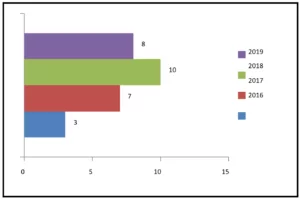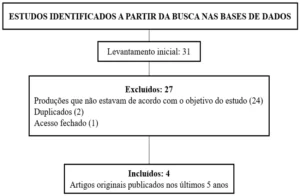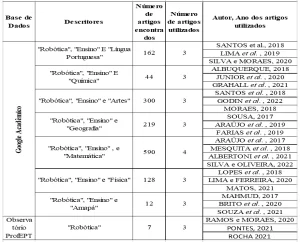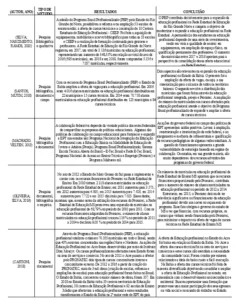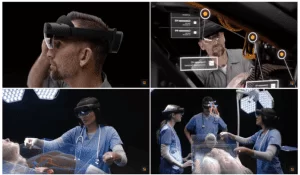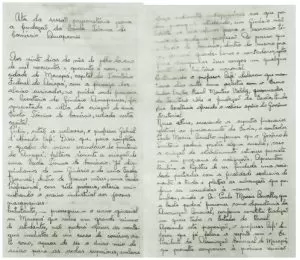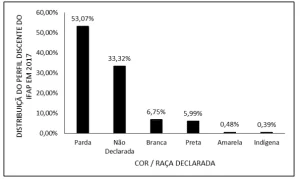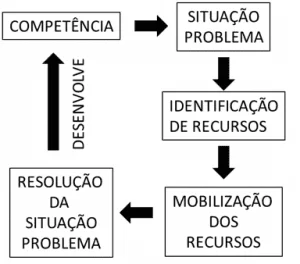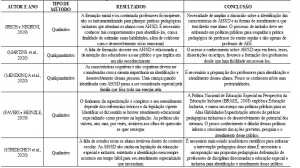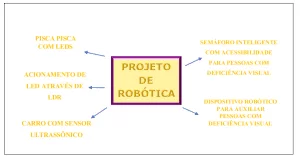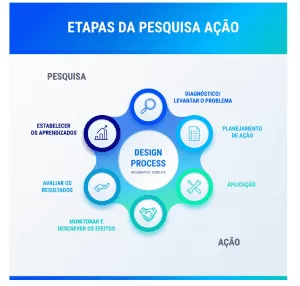ORIGINAL ARTICLE
CAMILO, Marcos Gomes [1]
CAMILO, Marcos Gomes. The Elkonin-Davidov System: A Grove of Developmental Teaching Theory. Revista Científica Multidisciplinar Núcleo do Conhecimento. Year 06, Ed. 06, Vol. 06, pp. 142-158. June 2021. ISSN: 2448-0959, Access link: https://www.nucleodoconhecimento.com.br/education/developmental-teaching, DOI: 10.32749/nucleodoconhecimento.com.br/education/developmental-teaching
ABSTRACT
This article presents the essence of Elkonin and Davidov’s research on developmental didactics based on the assumptions developed by Vigotski, regarding the role of education and teaching, in the construction of the human psyche. In the meantime, we highlight the understanding of the importance of the connection between education and development, the definition of the role of the school in transforming the reality of its students, the purpose of the construction of scientific theoretical thought in the student and, also, how scientific concepts, which are mediated, can institute in the awareness. Regarding specifically the Elkonin-Davidov system, the development of thought that was and is considered a pedagogical revolution was emphasized. Finally, it exposes the main theoretical and practical contributions that the system has made, through laboratory research, experimental schools and in the public basic education network.
Keywords: Developmental teaching, Historical-cultural theory, Teaching/learning.
1. INTRODUCTION
The context experienced, with regard to the teaching/learning process, has been a great challenge to educators in this generation. Educating responsibly, mediating the teaching process, is not an easy task and requires dedication, knowledge, proper training, continuing training, scientific theoretical knowledge. Being a teacher is a profession of a social nature, because it values change, the transformation of its students in what is related to learning.
Vygotsky’s historical-cultural theory collaborates with many teachers on how to deal with the student in order to transform him as a social being.It is a theory that defends that transformation takes place already in the first years of existence, in which the child appropriates knowledge and reproduces them in their different activities throughout their life, thus forming their habits, their personality, their ideas, their intellectuality.
Vygotsky’s theory, historical-cultural, also known as the Vygotsky School, was developed in the 20th century in the Soviet Union and had as its thesis that the human being is a being of an especially social nature. It was necessary to identify, in the eyes of psychology, how the human being develops his intelligence and his consciousness, making him different from animals, the basis for the construction of developmental didactics.
The Elkonin-Davidov system, based on Vygotsky’s assumptions, rightly focuses on teaching the development of thought. It was an experimental method that proposed the investigation of the potentialities of the subjects, children or not, of school age. The authors engaged in both social and personal transformation of the students.
The presence of the teacher in this development process is indispensable, because it will lead the student to master his thinking strategies, and then lead him to acquire his knowledge. A very important concept is that of the task, since it must be elaborated in order to promote development, according to the intentions with common objective or needs of the student. Thus the student will develop his/her potential, his/her intellectual autonomy, because he/she will have internalized the theoretical knowledge necessary for the exercise of citizenship.
Thus, this text seeks to bring a bibliographical investigation, in the search to answer the key question: what are the main contributions of the Elkonin-Davidov system to the educational field? To this end, it will then deal, in its first chapter, with the principles that gave rise to developmental teaching; the second chapter will provide an explanation of what the Elkonin-Davidov system is about and, finally, the third chapter will bring the contributions of Elkonin and Davidov’s work to the implementation of scientific research methodologies.
2. PRINCIPLES OF DEVELOPMENTAL EDUCATION
Let us initially deal with this great researcher in pedagogical psychology, who is part of the third generation of the scientific school and who developed his work in the post-war period, from 1950. His name is Vasily Vasilyevich Davidov, a Russian who based all his research on the postulates of Lev Semenovitch Vygotsky and his historical-cultural theory.
Davidov aimed his research at the development of the thinking of children and also of young people, considering that the school was insufficient for their training. Their opportunity was that the school, as an education system, would guide its students so that they would lead them to be autonomous subjects, thus fostering mental development.
His theory about teaching/learning highlights very well how education influences the development of its students, helping them to develop critically, with abstract and dialectical thoughts.
In his research in the field of pedagogical psychology, Davidov highlighted the important connection between education and development. Thus, through living with adults and the other, the child develops his psychic functions within the school, and in the long run, the child appropriates the learning, making them part of himself. Davidov assimilates learning as inherent based on historical and social development. Also, according to Libâneo and Freitas (2013, p. 325), Davidov argued that “learning is not, in itself, development, but, if organized correctly, activates processes of mental development of the child that would be impossible outside the learning process”.
Like Davidov, other authors such as Daniil Borisovich Elkonin, Piotr Yakovlevich Galperin, Alexis Nikolaevich Leontiev and Leonid Vladimirovich Zankov were disciples of Vygostsky in his research on historical-cultural theory.
Davidov and Elkonin concluded in their research that for school-age children, “basic transformations through study activity, theoretical-abstract thinking and free regulation of conduct should be oppored” (Libâneo; Freitas, 2013, p. 325). Thus, it would be important for teaching to be organized according to the zones of proximal development (ZDP), a central concept in Vygotsky’s historical-cultural psychology.
Later, it differentiated the theoretical thinking from empirical thinking and how they would need to occur in schools. Like this
Theoretical thinking is a level or quality of thought characterized by the ability (and motivation) to reveal the essence, substantial characteristics and relationships of an object. It is distinct from empirical thinking, which is more directed to superficial characteristics and relationships of phenomena (LOMPSCHER; GIEST, 2003, p. 270, my griffin).[2]
The soul of this developmental teaching, for Davidov, is the theory of study activity, being a practice to be developed by every child since the initial grades. What he always sought was the characterization of the psychic level of development of his objects during the performance of the study activities.
The theory of developmental education became known as the Elkonin-Davidov system. There was training for Russian teachers to work with this system. Much is emphasized in this system the dialogue with other cultures, aiming at the essentiality of each without overlap of one another. Thus, gradually methods were created for the elaboration of school disciplines and programs, so that, through experiments, the processes of the students’ mental formations during the performance of their activities were investigated with mediation.
2.1 THE THEORY OF DEVELOPMENTAL EDUCATION AND THE CONCEPT OF ACTIVITY
The essentiality of this theory is the concept of activity, and this concept is the bridge between living and extrinsic existentiality. Every activity is understood as a process of transformation of reality through the action of another individual. In this way, the appropriations resulting from social and cultural practices take place. Thus, the so-called collective activities are reproduced. These activities are acquired in the historical-cultural context that become intrinsic, that is, individual.
Davidov still internalizes the elements of Leontiev’s theory, describing that the activity is related to the creation or modification of something physical or spiritual, but goes beyond Leontiev’s conception when adding, desire. “Desire is essential in the interdisciplinary structure of the activity (…) is the basic core of a need” (Davidov, 1999, p. 41). He also considered that actions are based more on desires than motives and that the actions of human beings consider emotions more. Furthermore, it stresses that
The most important thing in scientific activity is not reflection, neither thought nor task, but the sphere of needs and emotions (…). Emotions are much more fundamental than thoughts, they are the basis for all the different tasks a man lays for himself, including the tasks of thinking. (…) The most important thing is that emotions enable a person to decide, from the beginning, whether, in fact, there are physical, spiritual and moral means necessary for them to achieve their goal (DAVIDOV, 1999, p. 45, griffin mine)[3]
Thus, theoretical thinking extends to concepts, which, when transformed into tools, can be applied in everyday problems. What Davidov proposes is a teaching that promotes the potential of the student.
Forming concepts is the relationship between understanding the processes of knowledge, teaching/learning and study activity. The purpose is the construction of scientific theoretical thought in the student. Thus, it is up to the teacher to carry out the appropriate investigations with fundamental purposes for the teaching/learning process, structuring and planning the activities that will be carried out by the students.
Consequently, the awareness “implies, therefore, a relationship of otherness of the person towards himself, acquired through the self-stimulation produced by the word. Knowledge and recognition are functions of the word, and another person is always present in its formulation” (Toassa, 2006, p. 64). It is understood that scientific concepts, which are mediated by other concepts, instruct the awareness.
It happens that the individual replicates existing concepts by appropriating them. In practice, these existing concepts are a reference for their actions. Libâneo and Freitas summarize that
(…) In the process of learning a scientific object, its concept, that is, its idealized (thought) form always comes first, preceding its particular form. For example, learning the concept of number as the most general expressive concept of quantity relationships is the condition for the student to be able to deal with all particular types of number and their particular expressions of quantity relationships (LIBÂNEO; FREITAS, 2013, p. 335).
It is important, when elaborating an activity, the teacher mediate the theoretical concept and then the student use it in different forms and contexts. Through abstraction the student reaches the concepts of objects (contents). From there it will formulate its concrete manifestation, because it has already internalized the concepts. Davidov stresses that if abstraction occurs in a generalized way, the student will be able to deal with the objects of knowledge by applying them in problem solving in the particularities of their daily lives. In this passage of concept to concrete there is still empirical thinking. According to Libâneo and Freitas (2013, p. 336), “the formation of the empirical concept occurs through the passage from sensory concrete to abstract, imaginable, leading to empirical generalization”, which will allow students to perform significant mental operations.
Davidov’s proposal is in the prerogative of the student’s theoretical thinking. For him, in theoretical thinking, concrete is presented both at the beginning and in the result. It is still necessary that in the learning process the student identifies the essence of the object, thus making their own inferences. In this sense, “for historical-cultural psychology, the central problem was and continues to be the mediation of mind and consciousness” (Zinchenko, 1998, p. 44).
2.2 THE THEORY OF DEVELOPMENTAL EDUCATION AND STUDY ACTIVITY
The study activity includes, in developmental teaching, the student’s task of absorbing the improved social consciousness, a consciousness based on scientific theoretical studies. The study activity points to understanding. The importance is to form a theoretical thought correlated with the student’s experience, so that the student can apply it in different ways in particular cases.
Thus, it is understood that the study activity is a typical action of man as a social being, which internalizes the processes that leads him to convert content to knowledge, which would be a new mental product.
According to Davidov,
The study activity and the study objective corresponding to it are linked, first of all, with the transformation of the material when, in addition to its external particularities, one can discover, fix and study the internal or essential principle of the material to be assimilated and, thus, understand all the external manifestations of this material. (DAVIDOV, 1999, p. 4, apud LIBÂNEO; FREITAS, 2013, p. 341).
What happens is the connection of the object of study with theoretical knowledge, causing apprehension, making theoretical knowledge intrinsic. Dado argues that the school is the environment for students to prepare for the study activity, and also stresses that the task of learning should lead to its development.
A task must have intentionalities, objectives to be achieved by students. The teacher when planning a lesson, a task, should have in mind development purposes that reach his students. No task should be disconnected from the context of a student’s experience or even detached from an objective to be achieved.
Talking about the student’s development and personality is to focus on how the study activity, and the means for them to be performed, can cause qualitative changes in the contribution of a better life experience for students, after all real learning happens when a student manages to reorganize mentally.
In this sense, Mello points out that
educators need to discover the most appropriate ways of working with their group. This is made possible when the educator knows the levels of real and close development of children, when he knows the regularities of their development, that is, he knows what psychic functions are in development and a certain stage and which constitute the periods most appropriate to the influences of education, and also, when he/she perceives which activity is main for the child at a certain stage of their development and provides the child’s experience under such (MELLO, 2004, p.152).
The whole process of understanding, apprehension and assimilation of contents/objects that occur in school is learning. It is also emphasized that the school is not the only place for assimilation of knowledge, because these can come from social life.
Thus, it can be said that to effect developmental teaching is to organize teaching so that the student enables itself a degree of improvement in which his better aptitude leads him to reach intellectuality.
3. ELKONIN-DAVIDOV: A SYSTEM FOR SOCIAL TRANSFORMATION
As discussed earlier, the Elkonin-Davidov system emphasizes the development of thought. The theory of developmental teaching was the result of an experimental empirical research carried out for an estimated time of forty years and was considered a pedagogical revolution.
It was through this research that new curricula were developed for primary schools, as well as textbooks and pedagogical instruments for teachers. Developmental teaching was characterized by Davidov as a reference for the transformation of the social and also personal being of the student. All personal, emotional and intellectual transformation from Davidov’s perspective was development.
Davidov stressed that for the development of learning, it is necessary that the student assimilates his theoretical knowledge through mental operations, whether analysis, reflection or planning. It is through these mental conditions that developmental teaching differs from the teaching of the traditional school, because this system provides the transformation of the student with a focus on their autonomy and authenticity, that is, in this system the student is legitimate in his learning.
3.1 CHARACTERISTICS OF DEVELOPMENTAL EDUCATION
Vygotsky’s theory materialized with Davidov with a few differences, always highlighting the importance of theory and its concepts. As already mentioned, leontiev’s elements with regard to human activity also integrated into his theory.
In view of these foundations, Freiras and Libâneo (2019) classify the characteristics of developmental education according to Davidov as follows:
-
-
- Purpose the broad personal and social transformation of the student;
- Development as essential transformations in the intellectual, emotional and personal spheres of students;
- Appropriation of material and intellectual culture as the universal way to promote the development of students;
- Student development associated with the mastery of the thought and action methods underlying the concepts;
- Appropriation of concepts and underlying generalized methods of thought and action as the main content of teaching and learning;
- Study task that ensures the realization of reproductive and creative mental actions by students. (FREIRAS; LEBANESE, 2019, p. 376).
-
The importance of working together, where student teacher, unite so far to appropriate and share knowledge, stands out here. The role of the school is precisely to train students who have autonomy and independence. It is the school’s articulation function to bring its curriculum closer to the interests and sociocultural practices of the students.
Appropriating knowledge in developmental didactics depends on the concrete participation of the student. Being active, they will be able to face any situation of their daily lives. This does not mean that the student must learn alone, on the contrary, it is necessary that every action in the teaching/learning process is mediated and that he/she has intentions that developthe student qualitatively.
4. CONTRIBUTIONS TO SYSTEMS BUILDING METHODOLOGY
The work undertaken by D.B. Elkonin and V. V. Davidov, as well as the history of its construction, served not only as a reference for implementations in the educational field, but also as a methodological parameter so that other researchers could theorize, experiment, validate future investigations and/or new systems, in view of its practical execution, assisting in predicting the possible challenges to be faced by future study groups, in view of any new discovery that was made (PUENTES, 2017). Over several decades of history, the magnitude of Elkonin and Davidov’s work became the target of intense evaluations, so that it was possible to identify at least five phases, well defined and that marked the entire trajectory of their activities, which will be addressed in separate topics.
4.1 PHASE I (1958-1975) – IDEALIZATION, EXPERIMENTATION AND SYSTEM DESIGN
At the end of 1958, Elkonin began psychological studies of the activity in school children, being the landmark of the first actions to idealize, elaborate and establish the fundamental principles of what has become a new theory and a new psychopedagogical system: the theory of the study activity and the Elkonin-Davidov system (LAZARETTI , 2011). Since then, laboratory research was carried out, undertaken, at first, by a small team of experimenters, gathered from the psychology division of Moscow State University, among these Davidov. This group played a very important role in the development of the Elkonin-Davidov system.
In addition to laboratory (internal) research, training experiments were carried out in school (external) environments, in the initial years of basic general education (primary school) and some subjects among high school students. During the first two years of the study, the initial results were published. The objectives were: to determine the content and structure of the students’ study activities; structure the logical-psychological bases of school subjects; understand the peculiarities of the students’ psychic development; to research the reasons for psychic development in the different school years and the particular characteristics in the organization of the formative experiment (DAVIDOV, 1988).
This activity gained prominence from 1960, when Davidov assumed the position of director of the Laboratory, replacing Elkonin and, mainly, in 1963, when the Academy of Pedagogical Sciences granted the status of experimental educational institution no. 91 in Moscow (the first institution in which educational experiments were applied). Quickly, the proposal extended to several regions of the Soviet Union, with the emergence of new groups and laboratories. The most striking characteristics of this first were: 1) The elaboration of the bases of a psychological theory of teaching; 2) The elaboration of a theory of substantive (or theoretical) generalization; 3) The design of a didactic theory of teaching; 4) The development of a theory of diagnosis of study activity and; 5) The development of a training programme for teachers of experimental schools (PUENTES, 2017).
4.2 PHASE II (1975-1983) – BUILDING CONDITIONS THE SYSTEM WAS UNIVERSALISED
The theoretical and objective fruits of the Elkonin-Davidov system drew attention thanks to the superior performance of students in the experimental rooms, when compared with the students of traditional education, in 3 points: level of development of theoretical thinking, problem solving and self-learning. The system eventually acquired scientific and didactic-methodological recognition, after good expression in books and supporting materials and, together with the Zankoviano system, to be evaluated as a relatively different pedagogical possibility: the attention of education specialists and the Ministry of Education itself turned to this project, allowing, in 1970, the Minister of Education of the Soviet Union , Mikhail A. Prokof’ev, offered Davidov, the elaboration of a basic education system that incorporated the theoretical conception created by him, Elkonin and the different groups. So, what initially was limited to a theoretical project, applied to a still small number of experimental schools, now needed to be conceived and implemented on a large scale (PUENTES, 2017).
The demands began to have an object-substantive, curricular, didactic, methodological, pedagogical organization character, as well as teacher education. It was necessary to develop the content and logic of building primary education programs in Russian language and mathematics; to write the instructional materials for teachers and elaborate the teaching method, at the same time that researchers and members of the Elkonin-Davidov system continued their experimental research and scientific dissemination activities in the different cities in which they operated (PUENTES; AMORIM; CARDOSO, 2016).
However, the work was temporarily terminated by a number of factors: in 1983, a time of great censorship and political persecution, Davidov was expelled from the Communist Party and, consequently, from the Institute of Psychology; Mikhail A. Prokof’ev stepped down from his government position and in 1984 D.B. Elkonin. Due to this set of negative events, the system implementation process was interrupted in mass education. However this had already become a solid and finished system. (REPKIN; REPKINA, 1997, p. 12).
4.3 PHASE III (1983-1986) – CENSORSHIP, PERSERATION, DISSOLUTION AND STOPPAGE OF THE SYSTEM IMPLEMENTATION PROCESS
With Davidov’s dismissal and Elkonin’s death, although the experimental work had been officially discontinued and the research group dissolved, most members remained involved in research activities and theoretical experimentation at their own responsibility, adapting to the new conditions and opportunities that arose. In addition, the head of knowledge generated until then had already won the general public: researchers, scholars and interested parties had access to what had been published and the primary school no. 91 itself continued to work with the implemented system which gave rise to new publications. Although Davidov-Elkonin’s work had been officially extinguished, nothing prevented teachers and students from developing academic theses and/or publishing on the subject, which kept such a heated debate in the educational community (PUENTES, 2017).
4.4 PHASE IV (1986-1994) – IMPLEMENTATION OF THE SYSTEM AS AN OFFICIAL ALTERNATIVE OF THE MINISTRY OF EDUCATION
In 1986, the Communist Party of the Soviet Union (PCUS), recognizing Davidov’s expulsion as a serious mistake, reinstated him to the party and the direction of the Institute of Psychology and experimental research. In fact, this decision marked the end of a sad stage in the history of education in the country, which had suffered from censorship, varied persecution and criticism, and also the end of illegality, both of Davidov and of all other members of the Elkonin-Davidov system. A phase was opened characterized by the work of implementing the system, as an official alternative of the Ministry of Education in basic education, especially in primary education, which came as the main solution for solving the enormous quality problems, which still haunted the traditional national education system (LIBÂNEO; FREITAS, 2013).
It is at this time that Davidov publishes his most prominent work, Problemas do ensino desenvolvimental: pesquisa psicológica teórica e experimental “Problems of developmental teaching: theoretical and experimental psychological research”, which deals with various questions of general, infantile (evolutionary) and pedagogical psychology, in an argument supported by more than two decades of theoretical research and solid data, collected from practical results obtained in experimental schools. With the publication of this work, the didactic system developed by Elkonin and Davidov, in partnership with numerous researchers and experimental professors, came to be known both in the Soviet Union and abroad. Gradually the groups returned to work, aimed at clarifying the possibilities and conditions for the introduction of the Developmental Education system in the mass education school, however, although there was total freedom to do so, there was no government investment in such enterprises (REPKIN; REPKINA, 1997, p. 16).
The situation changed in 1990, when the Ministry of Education formed the Institute of Pedagogical Innovation of the Academy of Pedagogical Sciences of the Soviet Union and the various groups that were part of the Elkonin-Davidov system were linked or associated with the Institute at the brain of Davidov himself, in the form of independent laboratories. Educational, evaluation materials, books, pedagogical manuals and teacher training centers were developed. But despite efforts and the optimistic political landscape, the Elkonin-Davidov system faced the serious problem of the fragmentation of socialism in Europe in 1989 and the subsequent fragmentation of the Soviet Union in 1991, which led the grassroots groups outside Russia to disassociate themselves from the Institute for Pedagogical Innovation. There was a drastic loss of institutional and financial aid from the groups, since they had to seek support in the new nations that were now part, which caused the extinction of various groups and research centers. And, although Davidov’s work had not been barred, there was a serious reduction in his ballast of action, needing to fit into a new socio-political reality, so that it was possible to continue the production of didactic material, train teachers and implement the system in schools.
4.5 PHASE V (1994-ACTUALITY) – INTERNATIONALIZATION AND CONSOLIDATION OF THE SYSTEM
Through the changes, the Elkonin-Davidov system was able to be shaped enough to adapt to the new reality of Eastern Europe, growing and consolidating, entering the 21st century with new breath. There was the internationalization of the theory, with the creation of the International Association of Developmental Education of the Elkonin-Davidov System and the consolidation of the system, by constituting one of the three official primary education systems in several of the new countries that were created, from the former Soviet republics, even after davidov’s death.
In the early 2000s, the Elkonin-Davidov system was used by 2,500 schools, with integrated working groups with more than 1,800 participants, including researchers, teachers, collaborators and school principals, working throughout 72 regions of Russia, Ukraine, Latvia, Kazakhstan and Belarus. In addition, greater openness of Russia and the former Soviet republics allowed the work of Elkonin and Davidov to win over the world (PUENTES, 2017).
However, it is recognised that, although the Elkonin-Davidov system is a consolidated proposal, it arose on the basis of the different trends that have formed over more than fifty years of building an education and education system in the context of the building, mainly, of Soviet socialist society. And the fact that it was abandoned and then rescued, opened precedents for it to be studied and applied, in the meantime, by several researchers and independent and unrelated research groups of Davidov.
In Brazil, for example, the understanding of what developmental education is is not very accurate, as well as the misunderstanding that it is an educational expression in the singular, proper, as a cohesive, homogeneous and coherent theoretical paradigm. Thus, expressions such as developmental didactics, the Elkonin-Davidov system, the theory of study activity, the Zankovian system and the theory of formation by stages of mental actions and the concepts of Pa. Ya. Galperin and NF Talízina, among others, are commonly identified indistinctly, that is, as if they were part of the same thematic universe (PUENTES, 2017). In fact, they have common points of view, despite major internal theoretical-methodological discrepancies, as well as marked conceptual divergences in relation to the interpretation of Vygotski’s fundamental theses, on the place and role of teaching and education in human development (DAVIDOV , 1996). It can be said that the Elkonin-Davidov system, in the West, contributes more to the formation of other systems than is actually applied in its integrity.
5. FINAL CONSIDERATIONS
This article brought some of the contributions of Vygotsky and his followers, specifically Davidov and Elkonin. Its purpose was to present, even in a synthesized way, as suggested by the title, the historical-cultural theory and the proposal of developmental teaching.
What is evident is that the school must think of learning strategies that enable the full development of the student, being this a social being that needs training not only conteudist, but also critical. It is necessary that the school is to focus on the transformation of its students with a didactics that contributes to learning, that opportunities human development.
The present text, in particular, on the Elkonin-Davidov system, does not exhaust it, on the contrary: it creates conditions for a future study by locating and analyzing the most important stages in the construction of such a system, with the various constituents that compose it, the different theories developed over decades of research and experimentation, with their most relevant work fronts and the numerous and valuable works generated as the fruit of this work.
I conclude this article emphasizing to teachers the seriousness of promoting in their students the development of critical thinking, emphasizing that dialectics in this teaching/learning process is paramount for exchanging experiences. Knowing the audience with which you work helps the whole teaching process. Through the mediation of knowledge not only the student, but also the teacher will acquire historical-cultural knowledge that will improve their intelligence and personality in this time.
REFERENCES
DAVIDOV, V. V. Problemas lógicos-psicológicos das matemáticas elementares como matéria de estudo. In: ELKONIN, D. B.; DAVIDOV, V. V. (Orgs.). Возрастные возможности усв оени я з н аний (м лад ш ие классы школы). Moscou: Prosveshchenie, 1966.
DAVYDOV, V. V. A new approach to the interpretation od activity structure and contente. In: HEDEGAARD, M.; JENSEN, U. J. Activity theory and social practice: cultural-historical approaches. Aarhus (Dinamarca): Aarhus University Press, 1999, p. 39 – 50.
________. Problemas do ensino desenvolvimental: A Experiência da Pesquisa Teórica e Experimental na Psicologia. Revista Soviet Education, v. 30, n. 8, 1988. Disponível em: <http://webcache.googleusercontent.com/search?q=cache:zKkj-FVU0tUJ:professor.pucgoias.edu.br/SiteDocente/admin/arquivosUpload/5146/material/DAVYDOV%2520TRADU%25C3%2587%25C3%2583O%2520PROBLEMS%2520OF%2520DEVELOPMENTAL%2520TEACHING%2520(Livro).doc+&cd=1&hl=pt-BR&ct=clnk&gl=br>. Acesso em 27 mar. 2021.
FREITAS, R. A. M. da M., & LIBÂNEO, J. C. (2019). Didática desenvolvimental e políticas educacionais para a escola no Brasil. Linhas Críticas, 24. https://doi.org/10.26512/lc.v24i0.21850. Acesso em: 02 de novembro de 2020.
LAZARETTI, Lucinéia Maria. D.B. Elkonin: vida e obra de um autor da psicologia histórico-cultural. São Paulo: Editora Unesp, 2011.
LIBÂNEO, J. C.; FREITAS, Raquel A. M. M. Vasily Vasilyevich Davydov: A escola e a formação do pensamento teórico-científico. In: Ensino desenvolvimental: vida, pensamento e obra dos principais representantes russos/Andréa Maturano Longarezi Roberto Valdés Puentes. Organizadores. Uberlândia: EDUFU, 2013. p. 315 – 350.
LOMPSCHER, Joachim; GIEST, Hartmut. Formation of Learning Activity and Theoretical Thinking in Science Teaching. In: Vygotsky’s Educational Theory in Cultural Context. Alex Kozulin. Cambridge University Press. 2003. p. 267 – 288.
LURIA, A. R. (1979). The making of mind. Cambridge, MA: Harvard University Press.
MELLO, Suely Amaral. A escola de Vygotsky. In: introdução à psicologia da educação: seis abordagens/Kester Carrara (organizador). – São Paulo: Avercamp, 2004. p. 135 – 155.
PUENTES, R. V. Didática desenvolvimental da atividade: o sistema Elkonin-Davidov (1958-2015). Obutchénie – R de Didat e Psic Pedag, v.1, n.1, 2017. Disponível em: <http://www.seer.ufu.br/index.php/Obutchenie/article/view/38113>. Acesso em 27 mar. 2021.
PUENTES, R. V.; AMORIM, P. A. P.; CARSOSO, C. G. C. V. V. Repkin: vida, pensamento e obra de um dos principais representantes da didática desenvolvimental da atividade. In: PUENTES, R. V.; LONGAREZI, A. M. (Orgs.). Ensino desenvolvimental: vida, pensamento e obra dos principais representantes russos. Livro III. Uberlândia: Edufu, 2016, p. 1-35.
REPKIN, V.V.; REPKINA, N. V. Ensino desenvolvimental: teoria e da prática. Tomsk, 1997.
TOASSA, G. (2006). Conceito de consciência em Vigotski. Psicologia USP, 17(2), 59-83. Disponível em: https://doi.org/10.1590/S0103-65642006000200004. Acesso em: 02 de novembro de 2020.
ZINCHENKO, V. P. A psicologia histórico-social e a teoria psicológica da atividade: retrospectos e prospectos. In: WERTSCH, James V.; DEL RÍO, P.; ALVAREZ, Amélia. (Orgs.). Estudos socioculturais da mente. Porto Alegre: Artmed, 1998.
APPENDIX – FOOTNOTE REFERENCE
2. Theoretical thinking is a level or quality of thinking characterized by the ability (and motivation!) to reveal the essence, the substantial features, and the relationships of an object (cf. Davydov, 1988). It is distinguished from empirical thinking, which is more directed toward superficial features and relationships of phenomena.
3. The most important thing in scientific activity is not reflection, nor thinking, nor the task, but the sphere of needs and emotions (…). Emotions are much more fundamental than thoughts, they are the basis for all the different tasks that a man establishes for himself, including the tasks of thinking. (…) The most important thing is that emotions enable a person to decide, right from the start, whether, in fact, there are the physical, spiritual and moral means necessary for him to achieve his goal.
[1] Master’s student of the Graduate Program in Education of the Faculty of Inhumas – FACMAIS.
Submitted: April, 2021.
Approved: June, 2021.

